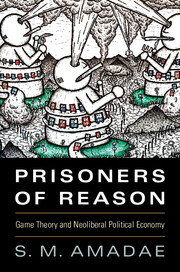11 - Tit for Tat
from PART III - EVOLUTION
Published online by Cambridge University Press: 18 December 2015
Summary
[Robert] Axelrod, like many political scientists, economists, mathematicians and psychologists, was fascinated by a simple gambling game called Prisoner's Dilemma. It is so simple that I have known clever men misunderstand it completely, thinking there must be something more to it! But its simplicity is deceptive. Whole shelves in libraries are devoted to the ramifications of this beguiling game. Many influential people think it holds the key to strategic defense planning, and that we should study it to prevent a third world war. As a biologist, I agree with Axelrod and [W. D.] Hamilton that many wild animals and plants are engaged in ceaseless games of Prisoner's Dilemma, played out in evolutionary time.
Richard Dawkins, 2009Since the Prisoner's Dilemma is so common in everything from personal relations to international relations, it would be useful to know how best to act when in this type of setting.
Robert Axelrod, 1984Noncooperative game theory has been applied to nuclear strategy, the social contract, public goods, and also evolutionary biology. Everywhere its logic is the same: optimization, or expected utility maximization, occurs on the level of individuals in a population who typically compete for scarce resources. The Prisoner's Dilemma game is emblematic of the perceived problem of cooperation: individuals seek propitious outcomes, but ultimately prefer their own gain, even at the expense of someone else's loss. Having generated the concept of an evolutionary stable strategy (ESS), evolutionary game theorists deduce that every population of actors must be impervious to a deviant member designed to exploit others (see Chapter 10). To protect against individuals’ exploitation by other actors, natural selection eliminates acts of gratuitous altruism because they would undermine its perpetrators’ survival chances, thereby eventually eliminating individuals disposed to this type of behavior. Even if group selection occurs among human societies, still every highly cooperative population must be impervious to individualistic exploiters. This, it is hypothesized, requires individualistic selfishness.
The Prisoner's Dilemma game has proven to be endlessly fascinating for representing the foil against which cooperative behavior must test its viability. Given evolutionary biologists’ interest in the material conditions of survival, that is, caloric intake and wherewithal to procreate, the tendency of organisms to waste resources in the suboptimal Nash equilibrium of the Prisoner's Dilemma inspired copious research.
- Type
- Chapter
- Information
- Prisoners of ReasonGame Theory and Neoliberal Political Economy, pp. 269 - 282Publisher: Cambridge University PressPrint publication year: 2016



